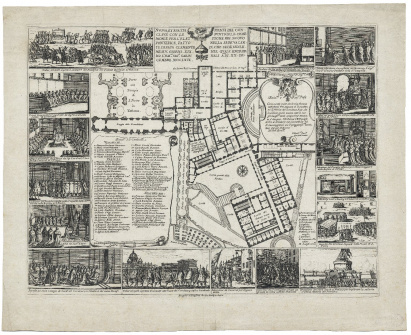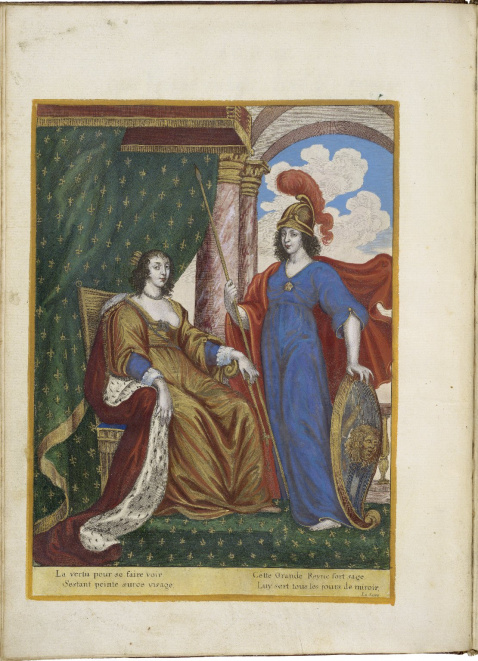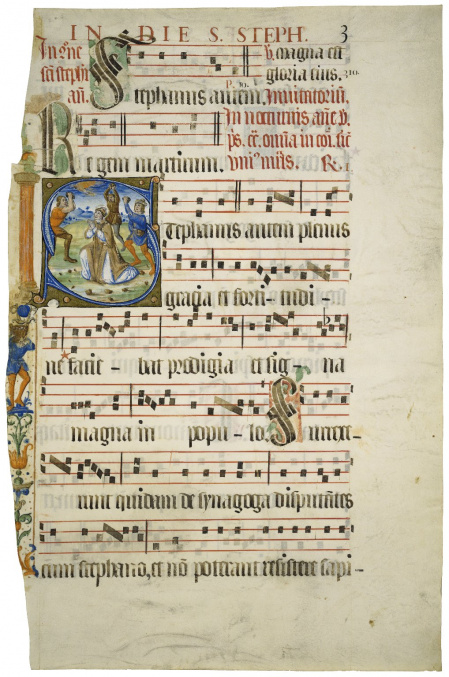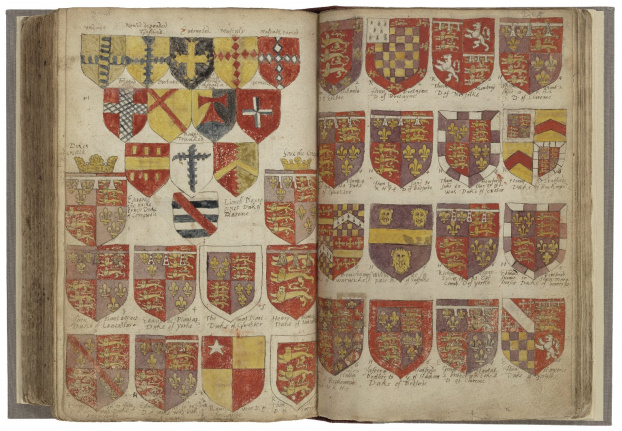Texts of Imagination and Empire: The Founding of Jamestown in its Atlantic Context
Directed by Claire Sponsler, Professor of English at the University of Iowa
June 21 through July 23, 2010
This NEH Summer Institute for College and University Faculty offered a comparative study of ritual and ceremony across related European cultures from 1300 to 1700. It built on anthropological theories of the ubiquitous role of ritual and ceremony and the impact of that work in performance studies. Testing assumptions about influence and exchange among national traditions and local contexts, it sought a new understanding of the processes and effects of cultural hybridity and assimilation.

Beginning with an exploration of the theories and definitions of “ritual,” each subsequent session advanced topically, chronologically, and geographically while touching on the implications of ceremony and ritual in religious, domestic, and secular contexts. Throughout the institute, participants used the Folger’s collections. They first read about ceremonies and liturgical performance through medieval authors including Hildegard of Bingen and Chaucer. Rituals surrounding motherhood and birthing practices, specifically the childbed, were also examined as sites of domestic ritualistic performance. Moving into the civic sphere, the session topics included records of Lord Mayor shows, pageant plays, royal entries, and other public ceremonies. The institute concluded with representations of ceremony on the early modern stage through histories and tragedies, discussions of the materials of ritual, and sites of pilgrimage.
Materials and Products
The syllabus is available here.
While the website is no longer supported, it has been archived: Institute Website: Ritual and Ceremony
A PDF of the website's pages with the participants' interpretive essays.
A PDF of the original promotional flyer.

Participants
(All affiliations are as of the program's date)
Bernadette Andrea, Professor of English, University of Texas, San Antonio
Christopher J. Bilodeau, Assistant Professor of History, Dickinson College
Rachel L. Burk, Visiting Assistant Professor of Spanish and Portuguese, Tulane University
Peter Craft, PhD Candidate in English, University of Illinois,Urbana-Champaign
J. Caitlin Finlayson, Assistant Professor of English, University of Michigan, Dearborn
Elina Gertsman, Assistant Professor of Medieval Art, Case Western Reserve University
Marcia B. Hall, Professor of Art History, Temple University
Matthew C. Hansen, Assistant Professor of English, Boise State University
Kenneth L. Hodges, Associate Professor of English, University of Oklahoma
John M. Hunt, Term Assistant Professor of History, University of Louisville
Matthew W. Irvin, Assistant Professor of English, Sewanee The University of the South
Nancy J. Kay, Adjunct Assistant Professor of Art History, Merrimack College
Andrew D. McCarthy, Assistant Professor of English, University of Tennessee, Chattanooga
Cynthia Nazarian, Assistant Professor of French and Italian, Northwestern University
Patrick O’Banion, Assistant Professor of History, Lindenwood University
Stephanie M. Seery-Murphy, Lecturer in History, California State University, Sacramento
Christopher Swift, PhD Candidate in Theatre Studies, City University of New York, Graduate Center
Lisa Voigt, Associate Professor of Spanish and Portuguese, The Ohio State University
Anne E. Wohlcke, Assistant Professor of History, California State Polytechnic University, Pomona
Suzanne M. Yeager, Assistant Professor of English and Medieval Studies, Fordham University
Faculty

(All affiliations are as of the program's date)
Ian Archer, Keble College, Oxford
Lawrence M. Bryant, California State University, Chico
Barbara Fuchs, UCLA
Gail McMurray Gibson, Davidson College
Bruce Holsinger, University of Virginia
Roslyn L. Knutson, University of Arkansas, Little Rock
Joseph Roach, Yale University
Helen Watanabe-O'Kelly, Exeter College, Oxford
Michael Wintroub, University of California Berkeley
Barbara Wisch, SUNY Cortland
Website Production
Claire Sponsler, Advisory Editor
Kathleen Lynch, Editor
Owen Williams, Associate Editor
Adrienne Shevchuk, Production and Managing Editor
Allison Isberg, Editorial Assistant
Swim Design, Design and Development
Julie Ainsworth, Folger Shakespeare Library Photographer

Folger Institute Staff
David Schalkwyk, Chair
Kathleen Lynch, Executive Director
Owen Williams, Assistant Director
Adrienne Shevchuk, Program Assistant
Matthew Carr, Intern
For more past programming from the Folger Institute, please see the article Folger Institute scholarly programs archive.
Hosted by the Folger Shakespeare Library. For more information about current summer seminars, please visit the National Endowment for the Humanities website.
Center for Shakespeare Studies
June 19 through July 28 2000
Institute Website (Archived): Website saved as PDF
Directed by Karen Ordahl Kupperman, Professor of History at New York University
This institute looks ahead to the celebration of the 400th anniversary of the founding of Jamestown in 1607 and the beginning of successful English colonization in America. But rather than taking a purely celebratory stance and seeing the English presence as somehow unique in American history, we will seek to place that venture in the context of contemporaneous French and Spanish efforts along America's east coast and within the Atlantic context in which all such enterprises were undertaken. The English who were conscious of their location on the margins of Europe---the "Suburbs of the old world" as John Donne wrote-now found themselves poised to look outward as Europe reoriented toward the west. Those who hoped that American exploits would pull their nation into the ranks ofthe leading European nations were also interested in Africa and the eastern Mediterranean region. The Powhatans among whom the first colonists settled had had extensive contact with Europeans before 1607 and brought their own understanding of Atlantic realities to this new relationship. Thus, the institute's premise is that we cannot understand what Jamestown should mean to us without looking at the entire Atlantic context in which it began and struggled through its early years.
We intend to explore the kinds of assumptions and expectations that European promoters and migrants brought to the business of colonization, including their ideas about other peoples, their notions of the engines of economic growth, and their conception of how society is constituted and how it could be replicated in a new setting. We will also explore the assumptions on which the Powhatans and other coastal Algonquians acted in allowing the first settlers to become established. The institute will consider the range of options open to Africans in this early period when the institution of slavery was coming into being in English colonies, and the ways in which they adapted their own traditions in unanticipated circumstances.
In order to accomplish this exploration, the faculty of the institute includes literary scholars, historians, archaeologists, and anthropologists, and the readings draw on a mix of disciplinary approaches and modes of scholarly analysis. The principal focus of the meetings will be on the primary sources of the period. We will look at familiar texts such as Sir Thomas More's Utopia and Captain John Smith's Generall Historie but also at other less well known sources such as John Pory's translation of Leo Africanus's A Geographical Historie of Africa (London, 1600). Encompassing Shakespeare's time as it does, the early period of colonization is illuminated by the Folger's vast collection of early printed and manuscript materials. Participants will work with documents in their first printed versions at the Folger Library, with the remains of the built and archaeological record in Jamestown itself, and with a range of other "primary" materials available on academic and institutional websites. In the course of the institute, participants will create a multifaceted web site with such features as a set of images culled from the Folger's collections, links to documents and other teaching and research materials on the web, and suggested syllabi and bibliographies for undergraduate courses.
Proposed Schedule and Faculty
"Texts of Imagination and Empire: The Founding of Jamestown in its Atlantic Context" will meet four afternoons a week, from Monday through Thursday (with the exception of the week of the 4th of July, when we will be in session on Friday), for the six weeks of 19 June through 28 July 2000. In the mornings, participants will be free to read in the Library or to meet informally with the faculty or their colleagues in the program. Daily tea breaks and occasional receptions will allow for conversation to continue in a more relaxed atmosphere that includes other scholars in residence at the Folger. On some evenings, the Folger will offer films dealing with issues arising from the reading.
The average week will include a sequence of presentations by Professor Kuppennan and the consulting faculty members, group discussions of required primary texts and archival materials, and oral reports by participants. Professor Kupperman will usually begin the week by reviewing the readings in primary and secondary sources and framing the discussion for the week. The second and third sessions of each week will feature the designated visiting faculty. On some days the period after tea will be used for participant presentations of research, pedagogical applications, or website analyses. The emphasis throughout will be on discussion and exchange.
Week One (19 - 23 June): English Culture on the Eve of Colonization
Week Two (26 - 30 June): Early Tentative Colonial Ventures
Week Three (3 - 7 July): Colonies Around the North Atlantic Rim
Week Four (10 - 14 July): Tracks on the Land
Week Five (17 - 21 July): Crawling Toward Success
Week Six (24 - 28 July): Stability and Extension
RESULTING PUBLICATIONS
Appelbaum, Robert and John Wood Sweet. Envisioning an English Empire. Philadelphia: University of Pennsylvania Press, 2005. F234.J3 J3255 2005